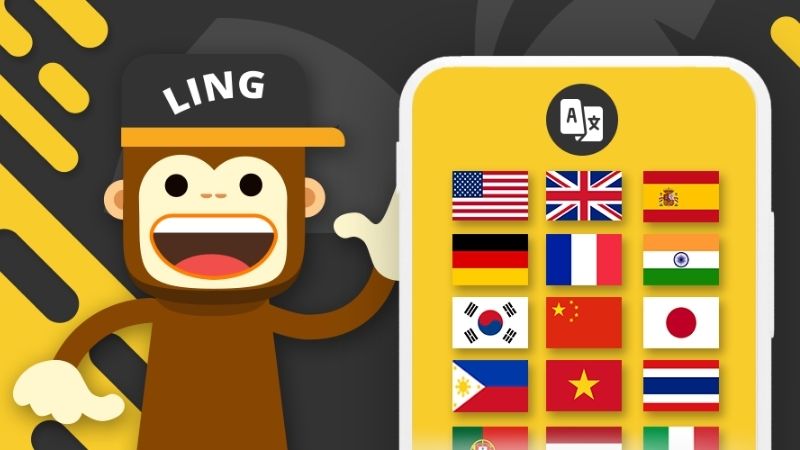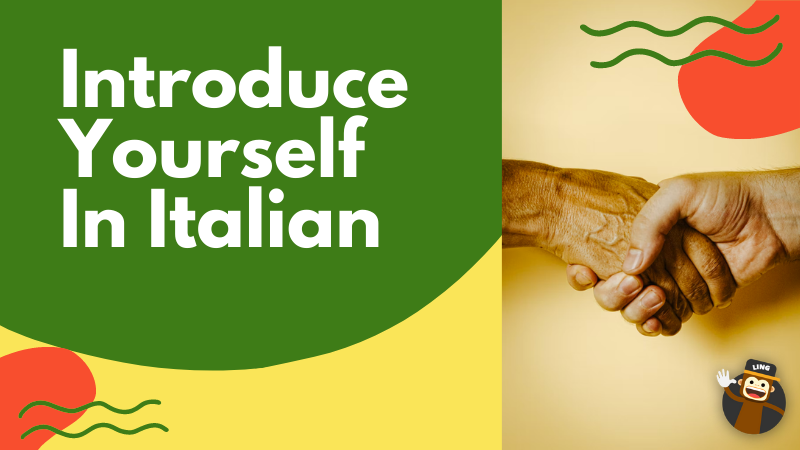Are you curious to find out how to introduce yourself in Italian? Then you have arrived in the right place. The introduction is the first thing people do when meeting each other in Italy. Typically, it includes the first and the last name, but it can also include other things such as where you are coming from, your work, where you live, age, and hobbies.
An excellent first impression depends on how well you can introduce yourself in Italian to your friends when meeting people for the first time and formally in a working environment. Typically, Italians are gentle, friendly, and hospitable people. Using good manners is the best way to win their heart. If you are ready to learn more about that, keep reading below!
Basic Phrases To Introduce Yourself In Italian

When you meet someone, the conversation always starts with greetings. Greetings are the first thing to learn at the beginner level and are easy to memorize.
Depending on the time it is and the situation, you can use the following:
- Buon giorno – Good morning or good day (used in formal cases)
- Buon pomeriggio – Good afternoon (used in formal situations)
- Buona sera – Good evening
- Buona notte – Good night (used in formal situations)
- Ciao – Hi (informal)
- A presto – See you soon
There is no written rule on which one to use. The time of the day and who you meet should guide you to choose the proper greeting. However, once the greetings are over, you can introduce yourself by your name and, after having shaken hands, continue to talk about yourself.
Here are some examples of introducing yourself in Italian:
- Mi chiamo [name] – I am called [name]
- Il mio nome è [name] – My name is [name]
- Sono [name] – I am [name]
If you are the one asking the other person’s name, you say:
- Come ti chiami? – What is your name? (Is used in an informal situation)
- Come si chiama – What is your name? (Is used formally)
You can also say your name first and then ask the other person’s name, for example:
- Mi chiamo [name] e tu? – My names is [name] and you?
Once you are told the name of the other person is always good to say that it was a pleasure to meet them. Here is how you can express pleasure:
- Piacere di conoscerti – Nice to meet you (informal)
- Piacere di conoscerla – Nice to meet you (formal)
- Molto lieto – Very pleased
- Lieto di conoscerla – I’m glad to meet you
Sometimes people can also ask, “how are you doing”:
- Come stai? – How are you?
- Sto bene, grazie. – I am fine, thank you.
Here is an example of how everything plays out when you talk:
- Ciao! Mi chiamo [name] e tu?
- Ciao! Io i chiamo [name], piacere di conoscerti.
- Il piacere è mio.
- Translation:
- Hello! My name is [name], and yours?
- Hello! My name is [name]. Nice to meet you.
- My pleasure.
Other Phrases Used During The Introduction

Following the name exchange, it is common to ask others where they are from, where they Iive, their age, etc.
Here are some common expressions to use during the introduction in the Italian language:
- Come stai? – How are you? (used in informal situations)
- Come va? – How are you? (used in informal cases)
- Come sta? – How are you? (used in formal situations or with older persons)
Asking About Someone’s Age
- Quanti anni hai? – How old are you?
- Ho [age] – I am [age].
Asking Where The Other Person Is From
- Da dove vieni? – Where are you from?
- Di dove sei? – Where are you from?
- Vengo da Roma – I come from Rome
For example:
- Vengo dall’Italia – I come from Italy
- Sono italiana/o – I am Italian
- Sono di Milano – I am from Milan
Asking People Where They Live
- Dove vivi? – Where do you live? (informal)
- Dove vive? – Where do you live (formal)
- Vivo a [place] – I live in [place]
Asking People About Their Job
- Che lavoro fai? – What is your job?
- Sono… [job title] – I am [job title]
- Lavoro come…[job title] – I work as [job title]
- Faccio il/la… [job title] – I do/make/produce etc. [job title]
For example, you can say:
- Sono un impietato – I am an office worker
Asking People What They Like To Do
If you are having a conversation with Italian speaking friends, it can happen they ask you if you are married:
- Sei sposato? – Are you married
- No, sono single – No, I am single
- No, ho un findanzato/fidanzata – No, I have a boyfriend/girlfriend
Asking People About Their Hobbies
When you are learning Italian to speak to your new friends, you could memorize a few words about what you like to do or learn how to ask them when they like doing:
- Quali sono i tuoi passatempo? – What are your hobbies?
- Il mio passatempo è …. – My hobby is…
- Nel mio tempo libero mi peace …- In my free time I like
What You Say When You Leave
When you complete the conversation, don’t forget to use some Italian phrases to say hello and leave:
- A presto – See you soon
- A dopo – See you later
- Arrivederci – Goodbye
When leaving, it is common to shake hands again in formal situations.
Ready To Master Italian?

Now that you’ve learned how to introduce yourself in Italian. Do you want to learn more languages? Or simply learn Italian? You can use Ling App by Simya Solutions. It is a language learning app that will give you all the tools to learn Italian and offers the possibility of learning more than 60 languages from a mobile device or desktop. In addition, if you already know a foreign language and want to improve your level of knowledge, the Ling App can take you one step higher towards proficiency.
Do you want to learn more words in Italian? Check out Italian Love Phrases and Italian Insults.
What are you waiting for? Download it from App Store and Play Store for free!


































































